Oil price volatility has failed to dampen the spirits of most oil executives who are optimistic that the future will be bright, a report reveals.
Oil companies are "upbeat" about capital investment, expect stable crude prices this year and see Asia and natural gas as emerging market opportunities, according to a study sponsored by the UK consulting and technical services company GL Noble Denton and published this week by the Economist Intelligence Unit.
"Asked to look ahead over the next year or so, industry executives surveyed and interviewed … see investment opportunities during a period of relative price stability, especially in the fast-growth economies in Asia," the study said.
"However, there are enormous challenges for the industry ahead," it added. "The Deepwater Horizon disaster at BP's Macondo oilfield in the Gulf of Mexico has many recalculating the risks the industry faces. … There is a new attitude to oversight in the industry in the US and elsewhere. This may lead to higher costs for industry and restrict the opportunities to those who can afford it."
John Wishart, the president of GL Noble, said the company sponsored the study to gain insight into its clients, which are primarily oil and gas companies and other concerns with exposure to the global energy industry.
"The nice part to come out was the cautious optimism about the future," he said.
"It has been tough for the past couple of years with everything that has happened: the downturn; and then Macondo. Just as we thought we were coming out of one storm, we went into another. It was the ultimate double whammy.
"The value of the study to us was the good news, in the sense that it looks like money is going to be spent," Mr Wishart added.
The report also indicated where most oil and gas industry project spending this year would take place.
"The Asia-Pacific region and the Middle East will be key areas," said Mr Wishart. "The big demand is now in Asia."
Of the 194 senior oil executives surveyed by the Economist Intelligence Unit during September and October, 76 per cent said they were "highly confident" or "somewhat confident" about the future. Almost half said they planned to increase capital spending this year, while a third said they would keep investment levels the same.
But 36 per cent of respondents identified "rising operating costs, including insurance premiums" as their chief concern. An additional 30 per cent cited "increasing regulation" as the biggest immediate challenge, with tighter oil industry regulation overwhelmingly expected in North America.
"Growth in capital expenditure will increasingly be accounted for by more complex and costly projects," the report said. "Technical challenges will mean larger investments."
"Our survey respondents clearly expect Macondo to have a lasting impact on their operations, investment prospects and profitability. More than two thirds expect high costs as a result of increased safety requirements," the intelligence unit continued.
Some 42 per cent of respondents identified oil and gas exploration and production as the industry segment that would show the strongest growth this year.
More than half, however, expected to see a rise in the use of service contracts, rather than the production-sharing agreements that most private-sector oil and gas companies prefer.
Another revealing result was that just over 40 per cent of respondents thought national oil companies would account for more exploration and production opportunities than international oil companies this year, while 35 per cent predicted the reverse.
The study described the evolving relationship between international and national oil companies as a "squeeze play" that was increasingly causing the chief executives of international oil companies to worry about access to new prospects. Budgetary pressures faced by national oil companies were causing them to bargain harder with their international partners on contract terms.
"For some foreign players, the price is sometimes not worth paying: the failure of two US oil companies, Chevron and Occidental [Petroleum], to extend their five-years oil and gas licences in Libya [last year] bears witness to the financial burdens imposed on these companies to operate in territories where tough fiscal terms apply," the study said.
Another noted trend in the industry was the move to natural gas, which the report said had "emerged as the key industry game changer, in a global context of rising energy demand".
The industry executives interviewed were mostly confident the current overhang in gas supplies would shrink as gas increased its share of the global energy mix.
"It is quite likely that the oversupply will be eaten away by demand, which means that we will continue to invest to get gas flowing in the second half of the decade," said Peter Voser, the chief executive of Royal Dutch Shell.





